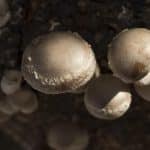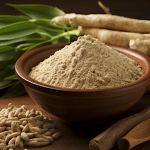Cordyceps mushrooms have been used in traditional Chinese medicine for centuries. But what does the science say about cordyceps benefits from these amazing mushrooms? Are there any real benefits to taking them?
Cordyceps is a genus of parasitic fungi that attacks insect larvae.
When these fungi infest their host, they replace its tissue and produce long, thin stems that sprout outside the body.
For hundreds of years, insects and mushrooms have been used in Traditional Chinese Medicine to cure tiredness, illness, kidney disease, and low sex drive.
Due to the numerous health advantages claimed for Cordyceps supplements and products, they have grown in popularity.
Two species of Cordyceps have received significant attention from the health research community: Cordyceps sinensis and Cordyceps militaris.
However, much of this research is limited to animal or laboratory testing, so there isn’t enough information on how it affects humans. However, they may have health advantages.
So What Are The 6 Cordyceps Benefits?
In this article, we will look at six of the most compelling cordyceps mushroom benefits backed by scientific evidence.
1. Cordyceps Mushroom Benefits Exercise Performance
Cordyceps are believed to boost the body’s production of adenosine triphosphate (ATP), which is required for muscular energy transport.
This might help your body utilize oxygen more efficiently, especially during physical activity.
Researchers investigated the effects of Cordyceps on exercise capacity in 30 healthy older adults using a bicycle in one study. For six weeks, participants took either 3 grams per day of a synthetic Cordyceps strain called CS-4 or a placebo pill.
VO2 max increased by 7% in those who had taken CS-4 after 36 weeks, whereas those given the placebo pill had no change.
VO2 max is a benchmark test that is used as a measure of your overall fitness level.
In a related research, 20 healthy older individuals were given either 1 gram of CS-4 or a placebo pill for 12 weeks.
Although the study found no change in VO2 max among either group, those who received CS-4 improved other measures of exercise performance.
A cordyceps mushroom blend was also studied in younger adults for its impact on exercise performance.
Compared to a placebo, the running program increased VO2 max by 11% after three weeks.
However, recent studies have debunked the claims that Cordyceps improve athletic performance in trained athletes.
2. Do Cordyceps Mushrooms Have Anti-Aging Properties?
Elderly people have long used Cordyceps to enhance strength and sex drive while reducing tiredness.
Their antioxidant content is said to be responsible for their anti-aging benefits.
Cordyceps has been shown to boost antioxidants in aged mice, which may aid with memory and sexual function.
Antioxidants are molecules that neutralize free radicals, which may cause disease and aging by damaging cells.
According to one study, mice that ingested Cordyceps lived several months longer than those who received a placebo.
A third study found that Cordyceps increased the life span of fruit flies, further corroborating the idea that it has anti-aging benefits.
However, it is uncertain if Cordycep has the same anti-aging effects in humans.
3. Are there Anti-Tumor Effects?
The anti-tumor effects of cordyceps have generated a lot of interest in recent years.
In addition, researchers believe the fungus may provide anti-tumor benefits in a variety of ways.
In test-tube research, Cordyceps have been found to stop the growth of several types of human cancer cells, including lung, colon, skin, and liver tumors.
Cordyceps may help to prevent and treat cancer in several ways. Lymphoma, melanoma, and lung cancer have all been shown to benefit from Cordyceps slowing the growth of the cancer.
Cordyceps may help to reverse the adverse effects of various cancer treatments, including leukopenia.
Leukopenia is a disease in which the quantity of white blood cells (leukocytes) falls, lowering the body’s defenses and increasing susceptibility to infection. It should not be confused with cancer leukemia.
A research examined the effects of Cordyceps on mice with leukopenia as a result of radiation and Taxol, a common chemotherapy medication.
Leukopenia reversed, and Cordyceps restored it. These findings suggest that the fungi may be beneficial in reducing the risks of some cancer therapies.
However, keep in mind that these studies were done on animals and test tubes rather than people.
The impact of Cordyceps on leukopenia and tumor development in people is uncertain, thus no conclusions can be drawn at this time.
4. Cordyceps Benefits for Type 2 Diabetes
Cordyceps contains a unique kind of sugar that may aid in the treatment of diabetes.
Diabetes is a condition in which the body’s cells are unable to respond to or produce insulin, a hormone that transports sugar glucose into your cells for energy.
When your body does not have enough insulin, glucose cannot enter cells, so it remains in the blood. Having too much glucose in the circulation can lead to serious medical issues over time.
As a result, it’s critical for those with diabetes to maintain tight glucose control.
Surprisingly, Cordyceps may help to keep blood sugar levels balanced by simulating the actions of insulin.
In diabetic mice, Cordyceps has been found in several studies to lower blood sugar levels.
They may help prevent kidney disease, which is a frequent diabetes complication.
In a meta-analysis of 22 investigations involving 1,746 individuals with chronic kidney disease, those who took Cordyceps supplements had greater kidney function.
However, this does not imply that the conclusion is valid. Many of the studies were found to be low-quality, according to the reviewers. As a result, it’s impossible to draw any conclusions about Cordyceps’ effects on kidney function in individuals with chronic kidney disease.
5. Heart Health Benefits of Cordyceps
The advantages of Cordyceps are becoming increasingly apparent, as studies examine the effects of the fungus on heart health.
Cordyceps have been used in China to treat arrhythmia, which is defined as a heartbeat that is too slow, fast, or irregular.
In rats with chronic kidney disease, Cordyceps reduced heart injuries, according to a research. Chronic kidney disease is linked to an increased risk of heart failure, therefore decreasing these injuries may help avoid it.
The researchers suggested that the adenine in Cordyceps was responsible for these effects. Adenosine is a naturally occurring chemical with heart-protective properties.
Cordyceps might also assist with cholesterol levels.
Cordyceps have been shown in animal studies to lower “bad” LDL cholesterol.
The build-up of cholesterol in your arteries can lead to heart disease, and the buildup of VLDL can do so.
Furthermore, cordyceps benefits have been found to reduce triglyceride levels in mice.
Triglycerides are a type of fat found in your blood. There is a link between high levels and an increased risk of heart disease.
Unfortunately, there is no evidence that Cordyceps improves heart health in humans.
6. Fighting Inflammation
It’s also claimed that cordyceps benefits can reduce inflammation in the body.
While inflammation is necessary, too much of it can cause disease such as heart disease and cancer.
Cordyceps has been shown in studies to lower the activity of certain inflammatory proteins in human cells.
The ability of Cordyceps to reduce inflammation has made it a potential anti-inflammatory pill or supplement.
Cordyceps, on the other hand, have been found to reduce airway inflammation in mice, making them a potential treatment for asthma. However, unlike popular medications used to treat inflamed regions of the body, the fungi appear to be less successful.
Cordyceps can also be used topically. It has also been found to reduce skin inflammation in mice when applied topically, further demonstrating its anti-inflammatory potential.
The potential inflammation-fighting properties of Cordyceps benefits have yet to be observed in humans.
Other FAQ’s
Can I take Cordyceps Everyday?
So, can you take cordyceps every day? While there is no official recommendation, most experts agree that it is safe to take cordyceps supplements daily in small to moderate doses. If you are thinking about taking cordyceps, it is always best to speak with your healthcare provider first.
How Long Does It Take For Cordyceps to Work?
When you’re looking for a natural supplement to give you an energy boost, cordyceps benefits may be the answer. But how long does it take for cordyceps to work?
The short answer is that it depends on the individual and the specific condition being treated. In general, however, most people report feeling an energy boost within a few days of taking cordyceps.
Conclusion
As you can see, there is a lot of research pointing to the potential health benefits of Cordyceps Mushrooms. Please feel free to checkout our other posts on some of the best cordyceps products we’ve personally reviewed, and let us know what you think.
You can find our favorite capsules, powders, and tincture’s on the following pages of our website and learn more about each individually:
Best Cordyceps Mushroom Gummies
Additional Resources:
Where Does Cordyceps Militaris Grow?
Updated 10/13/2022













